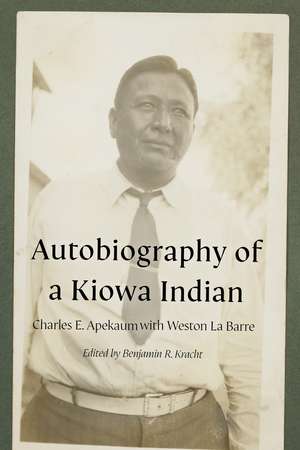Autobiography of a Kiowa Indian: American Indian Lives
Autor Charles E. Apekaum Editat de Benjamin R. Kracht, Weston La Barreen Limba Engleză Hardback – iul 2025
The following year, Apekaum traveled throughout Oklahoma with anthropologist Weston La Barre and ethnobotanist Richard Evans Schultes, serving as their liaison as they documented the peyote religion. During off days, Apekaum narrated his life story to La Barre, recounting the final days of the reservation, allotment, the early days of Anadarko, Oklahoma, his seventeen years attending boarding schools, service in the navy during World War I and then as a state game warden, his work translating for politicians, and his involvement in the Native American Church. La Barre never published the manuscript, which contains rich details about intertribal variants of the sacred peyote rite as well as about Apekaum’s life experience.
In Autobiography of a Kiowa Indian Benjamin R. Kracht presents Apekaum’s autobiography for the first time. This eyewitness account is an important addition to Native American life narratives and the reconstruction of Kiowa cultural, social, and religious life in the late nineteenth and early twentieth centuries in the southern Great Plains.
Din seria American Indian Lives
-
 Preț: 127.86 lei
Preț: 127.86 lei -
 Preț: 80.41 lei
Preț: 80.41 lei -
 Preț: 112.18 lei
Preț: 112.18 lei -
 Preț: 119.40 lei
Preț: 119.40 lei -
 Preț: 149.09 lei
Preț: 149.09 lei -
 Preț: 115.90 lei
Preț: 115.90 lei -
 Preț: 127.66 lei
Preț: 127.66 lei -
 Preț: 111.55 lei
Preț: 111.55 lei -
 Preț: 101.00 lei
Preț: 101.00 lei -
 Preț: 141.86 lei
Preț: 141.86 lei -
 Preț: 108.82 lei
Preț: 108.82 lei -
 Preț: 89.47 lei
Preț: 89.47 lei -
 Preț: 130.71 lei
Preț: 130.71 lei -
 Preț: 168.53 lei
Preț: 168.53 lei -
 Preț: 107.40 lei
Preț: 107.40 lei -
 Preț: 98.37 lei
Preț: 98.37 lei -
 Preț: 233.36 lei
Preț: 233.36 lei -
 Preț: 106.40 lei
Preț: 106.40 lei -
 Preț: 111.31 lei
Preț: 111.31 lei -
 Preț: 164.76 lei
Preț: 164.76 lei -
 Preț: 133.80 lei
Preț: 133.80 lei -
 Preț: 94.86 lei
Preț: 94.86 lei -
 Preț: 110.32 lei
Preț: 110.32 lei -
 Preț: 150.93 lei
Preț: 150.93 lei -
 Preț: 95.85 lei
Preț: 95.85 lei -
 Preț: 159.62 lei
Preț: 159.62 lei -
 Preț: 86.80 lei
Preț: 86.80 lei -
 Preț: 131.94 lei
Preț: 131.94 lei -
 Preț: 115.27 lei
Preț: 115.27 lei -
 Preț: 182.84 lei
Preț: 182.84 lei -
 Preț: 473.66 lei
Preț: 473.66 lei -
 Preț: 117.51 lei
Preț: 117.51 lei -
 Preț: 112.18 lei
Preț: 112.18 lei -
 Preț: 104.76 lei
Preț: 104.76 lei -
 Preț: 217.52 lei
Preț: 217.52 lei -
 Preț: 109.07 lei
Preț: 109.07 lei -
 Preț: 184.16 lei
Preț: 184.16 lei -
 Preț: 100.59 lei
Preț: 100.59 lei -
 Preț: 166.62 lei
Preț: 166.62 lei -
 Preț: 92.77 lei
Preț: 92.77 lei -
 Preț: 504.74 lei
Preț: 504.74 lei -
 Preț: 317.92 lei
Preț: 317.92 lei
Preț: 416.82 lei
Preț vechi: 514.59 lei
-19% Nou
Puncte Express: 625
Preț estimativ în valută:
79.78€ • 82.22$ • 67.35£
79.78€ • 82.22$ • 67.35£
Carte nepublicată încă
Doresc să fiu notificat când acest titlu va fi disponibil:
Se trimite...
Preluare comenzi: 021 569.72.76
Specificații
ISBN-13: 9781496243188
ISBN-10: 1496243188
Pagini: 250
Ilustrații: 7 photographs, index
Dimensiuni: 152 x 229 mm
Editura: Nebraska
Colecția University of Nebraska Press
Seria American Indian Lives
Locul publicării:United States
ISBN-10: 1496243188
Pagini: 250
Ilustrații: 7 photographs, index
Dimensiuni: 152 x 229 mm
Editura: Nebraska
Colecția University of Nebraska Press
Seria American Indian Lives
Locul publicării:United States
Notă biografică
Charles E. Apekaum (ca. 1890) was born during the final years of the Kiowa, Comanche, and Apache Reservation. He served as interpreter for the Santa Fe Laboratory of Anthropology field expedition in 1935, among many other jobs as a translator. Weston La Barre was an anthropologist best known for his work on traditional uses of plants in Native American religions and use of psychoanalysis in ethnography. He is the author of The Peyote Cult, a landmark work in psychological anthropology. Benjamin R. Kracht is a professor emeritus of anthropology at Northeastern State University in Tahlequah, Oklahoma. He is the editor of Stories from Saddle Mountain: Autobiographies of a Kiowa Family by Henrietta Tongkeamha and Raymond Tongkeamha (Nebraska, 2021) and the author of Kiowa Belief and Ritual (Nebraska, 2017), among other books.
Cuprins
List of Illustrations
Introduction
Acknowledgments
1. Family Life: Childhood to Adulthood
References
Index
Introduction
Significance
Editing
Preface by Weston La BarreEditing
Acknowledgments
1. Family Life: Childhood to Adulthood
Overview
Narrative
2. School Days, Navy Life, and PoliticsNarrative
Overview
School Days
Navy Life
Politics
3. ReligionSchool Days
Navy Life
Politics
Overview
Peyotism vs. Christian Beliefs
Early Peyote Use among the Kiowas
Peyote Doctoring, Visions, and Witching
Peyotism among the Comanches, Caddos, Osages, and Other Tribes
Peyote Songs
Mixed-Blood and Non-Indian Peyotists
Apekaum and the Native American Church
Peyote and the Ten Medicines
NotesPeyotism vs. Christian Beliefs
Early Peyote Use among the Kiowas
Peyote Doctoring, Visions, and Witching
Peyotism among the Comanches, Caddos, Osages, and Other Tribes
Peyote Songs
Mixed-Blood and Non-Indian Peyotists
Apekaum and the Native American Church
Peyote and the Ten Medicines
References
Index
Recenzii
“Kiowa storyteller Charles Apekaum describes his homeland during a critical transition from traditional life on the Great Plains to reservation times. This is an essential volume in the unfolding traditions of Plains Indigenous history.”—Denise Low, author of The Turtle’s Beating Heart: One Family’s Story of Lenape Survival
Descriere
Anthropologist Benjamin R. Kracht presents one of the few Kiowa autobiographies in publication—the life narrative of Charles E. Apekaum of the Kiowa Nation of Oklahoma, whose services as a translator were sought by many.
